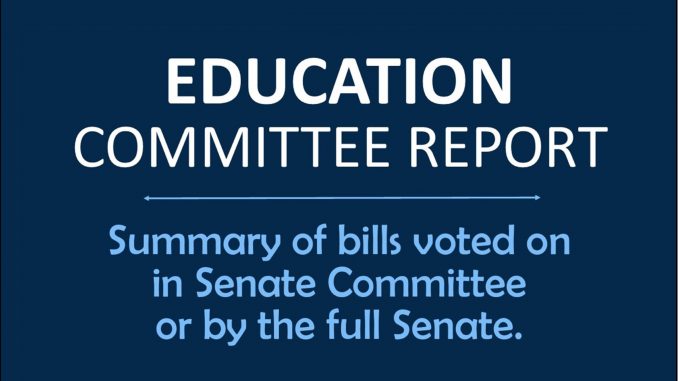
SSB 1029 – Financial literacy graduation requirement extended
SSB 1031 – Setting new teacher prep assessment score requirements
SSB 1032 – Whole grade sharing incentives extension
SSB 1033 – Extending allowable driving miles for certain minors
SSB 1042 – Requires public safety to consult on school safety plans
COMMITTEE ACTION:
SSB 1029 – Financial literacy graduation requirement extended
SSB 1029 extends the requirement that all high school students enrolled public or nonpublic schools take a one-half unit course in personal finance literacy as a condition of graduation until the 2022-2023 graduating class.
[1/28: Short Form]
SSB 1030 – Mental health professional added to loan repayment
SSB 1030 adds mental health professionals to those eligible for loan repayment under the Health Care Loan Repayment Program administered by the College Student Aid Commission. To qualify, applicants must complete an affidavit verifying they will practice full-time in a service commitment area in Iowa. The annual amount of loan repayment to a program applicant is $6,000 or 20 percent of the recipient’s total qualified student loan, whichever is less.
[1/30: Short Form (Excused: J. Smith)]
SSB 1031 – Setting new teacher prep assessment score requirements
SSB 1031 authorizes the Department of Education to set the minimum passing scores necessary for a student to successfully complete a practitioner preparation program and receive an initial teaching license. Currently, students must achieve scores above the 25th percentile nationally on certain subject and performance-based assessments.
A committee amendment eliminated the requirement to use the assessment provider recommended scores because of the potential consequences of disqualifying 400 new teachers a year. Instead, the Department will use a comparison of set scores in contiguous states or the 25 percent nationally set score.
The bill also establishes a one-year waiver procedure for students who do not attain the minimum assessment score. This one-year waiver is available for both in-state students and out-of-state teacher preparatory students who can show proof of a job offer in Iowa. It is only good for a temporary one-year license so that the beginning teacher can re-take the Praxis assessment during that year.
[1/30: Short Form (Excused: J. Smith)]
SSB 1032 – Whole grade sharing incentives extension
SSB 1032 extends the state’s school district reorganization incentives that are set to expire at the end of FY20. Incentives include:
- Uniform levy rate reductions replaced with state aid: The uniform levy rate is $5.40/$1,000 of assessed valuations. The rate reductions are phased out over a three-year period and for districts with enrollments of fewer than 600 students, the uniform levy rate will be reduced $1 in year one, $0.50 in year two and $0.25 in year three. Additionally, if a school district has an enrollment that exceeds 600 students and has merged with a district with an enrollment less than 600, that district will receive a reduction in the uniform levy amount equal to that generated from the rate reduction for the other district.
- Reorganization supplementary weighting: School districts that have a whole-grade sharing agreement and reorganize under this incentive plan may receive supplementary weighting equal to the whole-grade supplementary weighting received in the year prior to the reorganization for resident students. Districts can receive reorganization incentive supplementary weighting for up to three years. However, the combination of whole-grade sharing supplementary weighting and reorganization incentive supplementary weighting cannot exceed six years.
The state aid cost for this incentive program from FY07 through FY17 totaled $21.5 million, with the uniform levy incentive accounting for $9.4 million and the supplementary weighting incentive accounting for $12.1 million.
[1/28: Short Form]
SSB 1033 – Extending allowable driving miles for certain minors
SSB 1033 allows a student between 14 and 18 years old with a special minor’s driver’s license to drive up to 50 miles to and from school and school activities. Currently, a special minor’s driver’s license limits student driving to the hours of 5 a.m. to 10 p.m. over the most direct and accessible route between home and school for classes and extracurricular activities, and for up to 25 miles one-way. The bill increases this limitation to no more than 50 miles. Public school students are currently allowed to drive on a special minor’s licenses within their school district or to participate in extracurricular activities in a bordering school district.
[1/28: 11-4 (No: Celsi, Quirmbach, J. Smith, Wahls)]
SSB 1042 – Requires public safety to consult on school safety plans
SSB 1042 requires public and nonpublic schools to consider recommendations from the Department of Public Safety when developing high-quality emergency operations plans.
[1/30: Short Form (Excused: J. Smith)]
